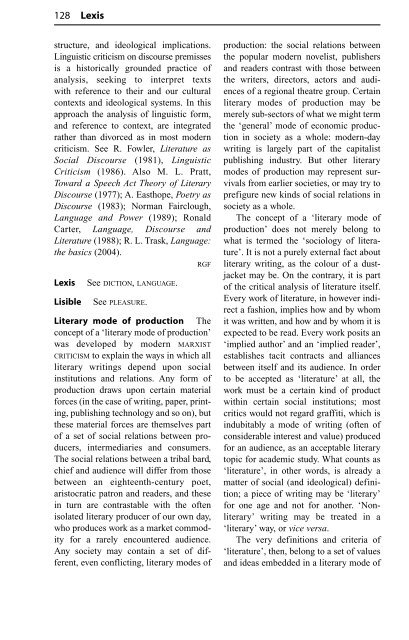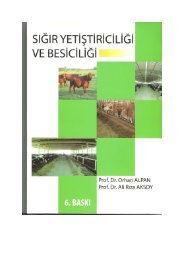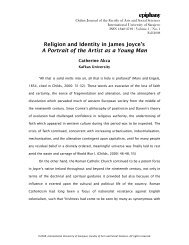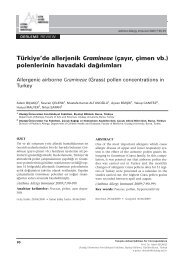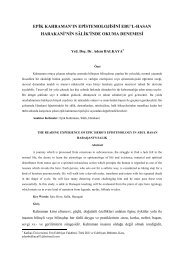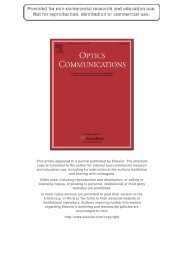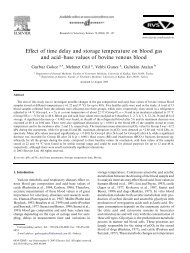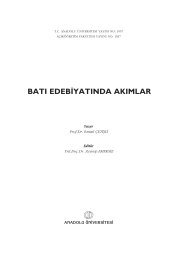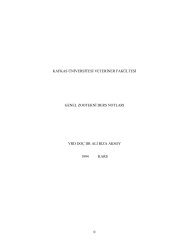The Routledge Dictionary of Literary Terms
The Routledge Dictionary of Literary Terms
The Routledge Dictionary of Literary Terms
Create successful ePaper yourself
Turn your PDF publications into a flip-book with our unique Google optimized e-Paper software.
128 Lexis<br />
structure, and ideological implications.<br />
Linguistic criticism on discourse premisses<br />
is a historically grounded practice <strong>of</strong><br />
analysis, seeking to interpret texts<br />
with reference to their and our cultural<br />
contexts and ideological systems. In this<br />
approach the analysis <strong>of</strong> linguistic form,<br />
and reference to context, are integrated<br />
rather than divorced as in most modern<br />
criticism. See R. Fowler, Literature as<br />
Social Discourse (1981), Linguistic<br />
Criticism (1986). Also M. L. Pratt,<br />
Toward a Speech Act <strong>The</strong>ory <strong>of</strong> <strong>Literary</strong><br />
Discourse (1977); A. Easthope, Poetry as<br />
Discourse (1983); Norman Fairclough,<br />
Language and Power (1989); Ronald<br />
Carter, Language, Discourse and<br />
Literature (1988); R. L. Trask, Language:<br />
the basics (2004).<br />
Lexis See DICTION, LANGUAGE.<br />
Lisible See PLEASURE.<br />
RGF<br />
<strong>Literary</strong> mode <strong>of</strong> production <strong>The</strong><br />
concept <strong>of</strong> a ‘literary mode <strong>of</strong> production’<br />
was developed by modern MARXIST<br />
CRITICISM to explain the ways in which all<br />
literary writings depend upon social<br />
institutions and relations. Any form <strong>of</strong><br />
production draws upon certain material<br />
forces (in the case <strong>of</strong> writing, paper, printing,<br />
publishing technology and so on), but<br />
these material forces are themselves part<br />
<strong>of</strong> a set <strong>of</strong> social relations between producers,<br />
intermediaries and consumers.<br />
<strong>The</strong> social relations between a tribal bard,<br />
chief and audience will differ from those<br />
between an eighteenth-century poet,<br />
aristocratic patron and readers, and these<br />
in turn are contrastable with the <strong>of</strong>ten<br />
isolated literary producer <strong>of</strong> our own day,<br />
who produces work as a market commodity<br />
for a rarely encountered audience.<br />
Any society may contain a set <strong>of</strong> different,<br />
even conflicting, literary modes <strong>of</strong><br />
production: the social relations between<br />
the popular modern novelist, publishers<br />
and readers contrast with those between<br />
the writers, directors, actors and audiences<br />
<strong>of</strong> a regional theatre group. Certain<br />
literary modes <strong>of</strong> production may be<br />
merely sub-sectors <strong>of</strong> what we might term<br />
the ‘general’ mode <strong>of</strong> economic production<br />
in society as a whole: modern-day<br />
writing is largely part <strong>of</strong> the capitalist<br />
publishing industry. But other literary<br />
modes <strong>of</strong> production may represent survivals<br />
from earlier societies, or may try to<br />
prefigure new kinds <strong>of</strong> social relations in<br />
society as a whole.<br />
<strong>The</strong> concept <strong>of</strong> a ‘literary mode <strong>of</strong><br />
production’ does not merely belong to<br />
what is termed the ‘sociology <strong>of</strong> literature’.<br />
It is not a purely external fact about<br />
literary writing, as the colour <strong>of</strong> a dustjacket<br />
may be. On the contrary, it is part<br />
<strong>of</strong> the critical analysis <strong>of</strong> literature itself.<br />
Every work <strong>of</strong> literature, in however indirect<br />
a fashion, implies how and by whom<br />
it was written, and how and by whom it is<br />
expected to be read. Every work posits an<br />
‘implied author’ and an ‘implied reader’,<br />
establishes tacit contracts and alliances<br />
between itself and its audience. In order<br />
to be accepted as ‘literature’ at all, the<br />
work must be a certain kind <strong>of</strong> product<br />
within certain social institutions; most<br />
critics would not regard graffiti, which is<br />
indubitably a mode <strong>of</strong> writing (<strong>of</strong>ten <strong>of</strong><br />
considerable interest and value) produced<br />
for an audience, as an acceptable literary<br />
topic for academic study. What counts as<br />
‘literature’, in other words, is already a<br />
matter <strong>of</strong> social (and ideological) definition;<br />
a piece <strong>of</strong> writing may be ‘literary’<br />
for one age and not for another. ‘Nonliterary’<br />
writing may be treated in a<br />
‘literary’ way, or vice versa.<br />
<strong>The</strong> very definitions and criteria <strong>of</strong><br />
‘literature’, then, belong to a set <strong>of</strong> values<br />
and ideas embedded in a literary mode <strong>of</strong>


